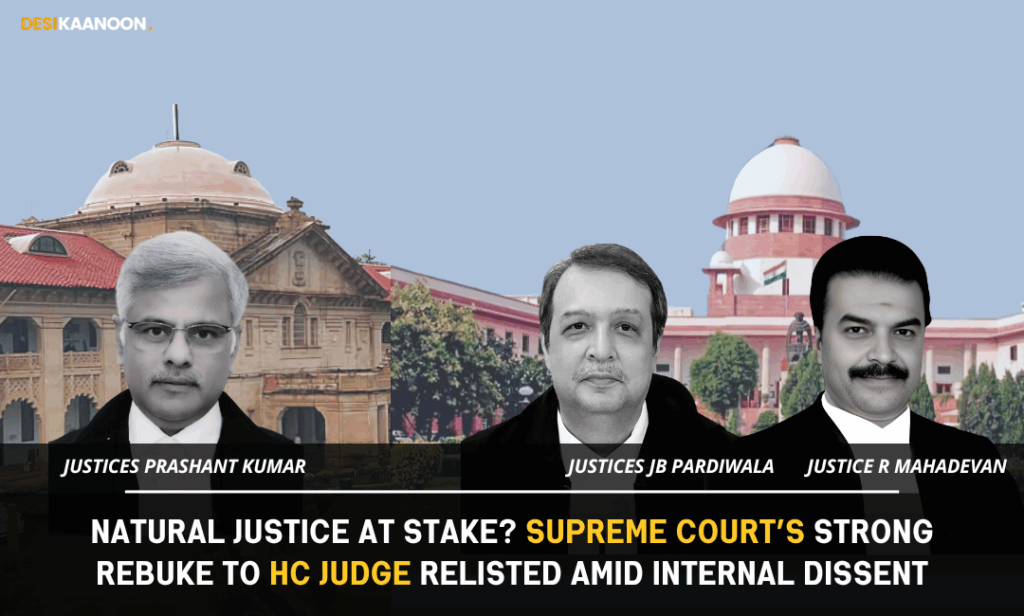Meenakshi Shukla
On August 4, 2025, the Supreme Court stirred significant debate after a Bench of Justices J.B. Pardiwala and R. Mahadevan passed a strongly worded order against Justice Prashant Kumar of the Allahabad High Court, directing that he be permanently removed from handling criminal matters until his retirement. The order has since led senior Supreme Court justices, such as Chief Justice of India B.R. Gavai, to intervene to correct what is being characterised as a violation of established judicial conventions.
The matter arose from Justice Kumar’s order dated 5th May 2025 in a case of M/S Shikhar Chemicals v. The State of Uttar Pradesh & Anr.2025 INSC 945. The complaint was about a supply of thread for ₹52.34 lakh, out of which ₹47.75 lakh had allegedly been settled. The complainant complained of non-payment of the balance and requested criminal prosecution. Justice Kumar upheld the validity of the complaint, noting that it would be “very unreasonable as civil suits take a long time” to require the complainant to resort to a civil remedy and that criminal prosecution was warranted. On appeal, the Supreme Court described this reasoning as “untenable” and stated:
“We are shocked by the findings recorded in paragraph 12 of the impugned order… The judge has gone to the extent of stating that asking the complainant to pursue civil remedy would be very unreasonable… We further direct that the concerned judge shall not be assigned any criminal determination, till he demits office.”
The order also instructed the Chief Justice of the Allahabad High Court to “immediately withdraw the present criminal determination from the concerned judge” and ensure he sits with a “seasoned senior judge” in a Division Bench.
However, the directive triggered an alarm within the Supreme Court itself. Multiple judges have reportedly taken exception to how the Bench castigated a High Court judge without giving him an opportunity to respond, causing a departure from principles of natural justice. Former Chief Justices of India, speaking to the media, stressed that errors in High Court judgments are not unusual and are routinely corrected on appeal, but such mistakes do not warrant punitive action from the apex court against individual judges.
Legal precedents reinforce this position. In Rajasthan vs Prakash Chand (1997) INSC 885, the Supreme Court held that “the Chief Justice is the master of the roster” and has exclusive authority to assign cases within a High Court. This principle, extended to the Supreme Court by a 2018 ruling, makes it clear that no Bench can direct roster changes that override the Chief Justice’s prerogative. Similarly, in Braj Kishore Thakur vs Union of India 1997 (4) SCC 65, the Court cautioned higher judicial forums against launching personal attacks on judges of lower courts, observing that “a judge who has not committed any error is yet to be born.”
Following the August 4 order, the Allahabad High Court temporarily adjusted its roster according to which Justice Kumar now sits with Justice M.C. Tripathi to hear land acquisition, development authority writs, and environmental matters, while Justice Dinesh Pathak has taken over his criminal docket.
The matter, initially disposed of, has been relisted before the Supreme Court for further hearing, signaling that the apex court may reconsider its controversial order. Legal observers are closely watching how the Court resolves the tension between correcting judicial errors and maintaining judicial discipline within the bounds of established constitutional principles.
Case name – M/S Shikhar Chemicals v. The State of Uttar Pradesh & Anr.
Special Leave to Appeal (Crl.) No.– 11445 of 2025
Bench – Justice J.B. Pardiwala and Justice R. Mahadevan
Instagram: Click here
LinkedIn: Click here
For Collaboration and Business: info.desikaanoon@gmail.com

